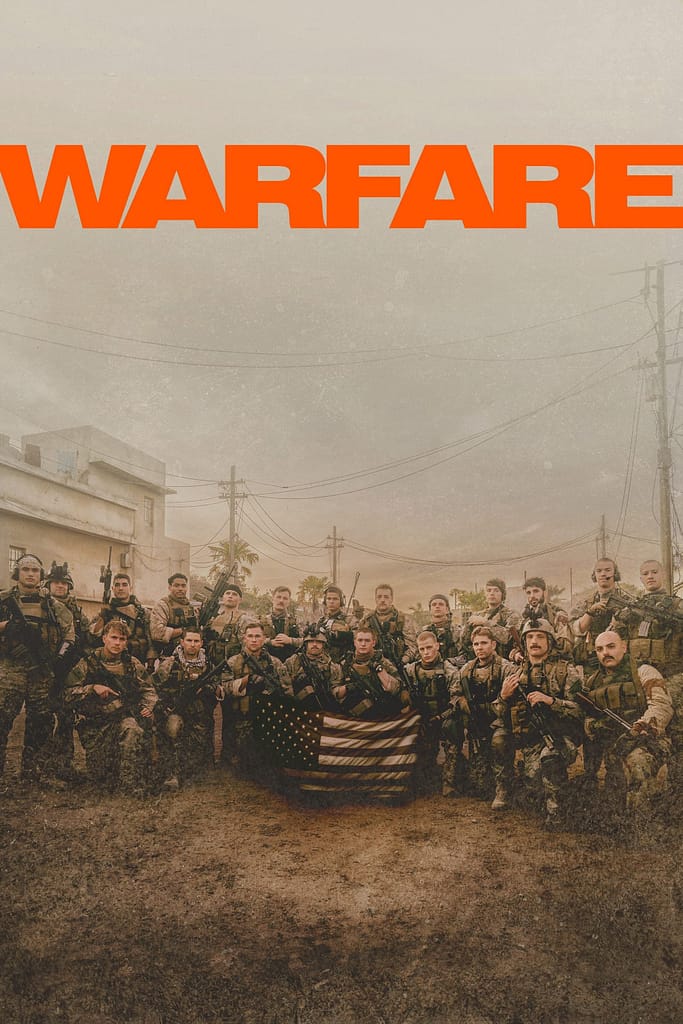My quick rating – 7.1/10. Warfare pulls no punches in delivering a raw and sobering depiction of modern combat. Eschewing the flag-waving bravado and bulletproof heroism that so often define Hollywood’s war epics, directors Alex Garland and Ray Mendoza instead focus on the uncomfortable, often chaotic truths of life on the ground during the Iraq War. Set in Ramadi, the film follows a platoon of Navy SEALs as they undertake a perilous mission — one that’s recounted not with glorified flashbacks but through fragmented, human memories marked by trauma, confusion, and moral ambiguity.
From the start, Warfare makes it clear this won’t be a traditional war movie. There are no grand speeches, no triumphant music, and no romanticizing of violence. Instead, it shows American soldiers occupying homes, pointing guns at terrified civilians, and navigating a hostile city where they are seen as invaders rather than saviors. The film wisely refuses to assign easy labels. Are the locals insurgents or protectors? Are the SEALs heroes or aggressors? The movie doesn’t answer that — it simply presents the situation as it was experienced, leaving viewers to confront the unsettling gray areas for themselves.
D’Pharaoh Woon-A-Tai, Joseph Quinn, and Will Poulter all deliver standout performances. Each actor brings vulnerability to their roles, portraying not larger-than-life warriors but young men caught in a nightmare they can’t control. Woon-A-Tai, in particular, offers a quietly devastating turn, his expressive performance showing more through silence than words. It’s through their faces, body language, and breakdowns that the true cost of war is conveyed.
Technically, Warfare is impressive. The sound design and editing are phenomenal — gunfire, drone strikes, even silence are used to visceral effect. If you’re streaming this one, it’s absolutely worth turning up the volume; the audio work adds a layer of immersion that enhances the overall tension. Visually, the cinematography is gritty but deliberate. It doesn’t romanticize the setting or the violence, but instead captures the constant unease that hangs over every moment.
That said, the film isn’t without its flaws. While it succeeds in capturing the emotional and sensory experience of war, it leaves viewers in the dark when it comes to the broader context. Little effort was made to explain the mission’s objective, the soldiers’ backgrounds, or even the political climate of Ramadi at the time. This intentional vagueness may be a stylistic choice, aiming to reflect the disorientation of the soldiers themselves, but I thought it weakened the narrative and limited my investment.
Additionally, while marketed as a film about Navy SEALs, their portrayal here may raise eyebrows. These are not the highly disciplined, elite operatives we often read about — they’re flawed, scared, and often reactive. As someone without military experience, I can’t speak to the accuracy, but I do wonder whether their depiction leans too far toward raw emotion at the expense of representing the professionalism and training that define such units.
Still, Warfare is a gutsy film that opts for discomfort over spectacle and asks more questions than it answers. It’s not a masterpiece, but it is a powerful reminder that not all war stories need to be crowd-pleasing blockbusters. Sometimes, just telling the truth, or as close as memory allows, is enough.

Amazon, along with these streamers are carrying this one at theater pricing as of 05.24.25
Log in to manage Simkl watchlist

